Table of Contents
Avishai Cohen Songbook Vol I
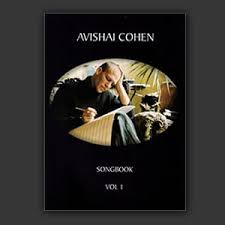
Best Sheet Music download from our Library.
Contents List Download:
Coming soon: Avishai Cohen Songbook Vol 2
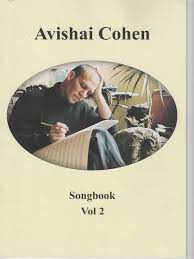
Please, subscribe to our Library.
If you are already a subscriber, please, check our NEW SCORES’ page every month for new sheet music. THANK YOU!
Avishai Cohen Songbook Vol 1 (Music)
Avisahi Cohen (biography)
Avishai Cohen, born in Kabri, Israel on April 20th, 1970, has over the course of his career helped bring the bass into the spotlight and has pushed the boundaries of jazz. His work has earned him international awards and global recognition, including the prestigious Miles Davis Award at the Montreal Jazz Festival in 2023. Avishai has developed a strong network of followers and listeners, striking a chord with the audience wherever he has performed. Meanwhile, his unique compositions have been used in many films, TV and other media. The stage is undoubtedly a place where Avishai feels at home, so much so that attending one of his live performances is probably the best way to get acquainted with his musical universe. DownBeat magazine called Avishai “a jazz visionary of global proportions” while Bass Player magazine declared him one of the 100 most influential bass players of the twentieth century.
Avishai grew up in a multicultural family whose roots are found in Spain, Greece and Poland. At home, music was always in the air, with his mother Ora listening to both classical and traditional music. Avishai’s musical journey started when he began playing the piano at nine years old. After moving to St. Louis, Missouri with his family aged fourteen, he continued to study the piano and discovered the bass guitar. The electric bass put a spell on him when his teacher introduced him to the music of luminary bassist Jaco Pastorius and Chick Corea’s Return to Forever. Back in Israel, Avishai joined the Music and Arts Academy in Jerusalem and turned to the upright bass. At the age of 22, having served for two years in an army band, he decided to take a big step and moved to New York City.
Avishai arrived in a wintry New York, January 1992. Moving to the Big Apple was a challenging decision, emotionally as well as professionally. The young Israeli had a tough beginning; performing on the streets and working in construction to get by. These small steps gave his music a unique sense of authenticity. He enrolled at the New School in New York City and was a contemporary there of such artists as Brad Mehldau and Peter Bernstein. Avishai was soon to be performing and recording with Panamanian pianist Danilo Perez’s Trio, reflecting the essential role that Latin music played in Avishai’s early years in New York.
In 1997 a call from Chick Corea changed everything. Avishai had prepared for this moment. He had passed one of Corea’s friends a demo tape. Chick listened to it in his car and called Avishai back a few weeks later, blown away by its freshness. As a co-founder of Corea’s Origina ensemble and a member of Corea’s New Trio, for over six years Avishai became an integral part of Chick’s music and received the opportunity to fine-tune his skills as bassist, composer and bandleader. Performing and touring with the master pianist played an important part in shaping Avishai’s musicianship. Avishai considers Chick a teacher, colleague and dear friend.
Avishai’s first four albums (1998’s Adama, 1999’s Devotion, 2000’s Colors, and 2001’s Unity) were released under Corea’s label Stretch Records and already featured the essence of his musical vision and original compositions. Mediterranean and Latin influences, the use of horns and vocals created a sound that is truly unique. Unity deserves a special mention. It is the first recording to showcase Avishai on piano. The album was recorded with Avishai’s International Vamp Band, a group of fellow musicians from different parts of the world (Mexico, Argentina, Cuba and Israel). The idea behind the cutting-edge project was to allow different cultures to interact and converse using the medium of music, delivering a message of peace and harmony.
The growing range of projects he was involved in led Avishai to create his own record label (Razdaz Recordz) with his manager in 2002, enabling him to follow his own path as well as record talented young musicians he believed in.
Lyla (2003), Avishai’s debut release on Razdaz Recordz, reflected his multifaceted artistic personality. The album incorporates sounds ranging from Latin rhythms to electronics.
At Home (2005) can be regarded as a metaphor defining Avishai’s music, “Music makes one feel at home everywhere.” Most followers will also recognize At Home featuring the composition “Remembering,” an evocative ballad performed with trio and to this day the most demanded encore at his live performances. “Remembering” has also been included on many occasions in film and TV throughout the world.
The cosmopolitan Continuo (2006) followed with great success and displayed the magic of a working trio unit. While the trio has largely formed the basis of Avishai’s recorded output, over the years many different musicians have occupied the drum and piano chairs. Each one brings a fresh perspective to the music.
In 2007, the live recording As Is…Live at the Blue Note was recorded in New York during a series of concerts at the legendary club.
After residing for many years in New York City, Avishai returned to his roots and moved back to Israel, releasing a fresh musical statement linked to his heritage and history. Sensitive Hours / Shaot Regishot (2008) attained gold sales status in Israel and was the first album to introduce Avishai’s vocals in all its compositions as well as songs in Hebrew. The album has since been released worldwide to great acclaim.
With Gently Disturbed (2008), Avishai achieved a masterstroke, hitting the right balance between a powerful trio set and delicate compositions. This release was an amalgamation of melody and groove, complexity and simplicity perfectly executed by Avishai’s working trio including Shai Maestro (piano) and Mark Guiliana (drums). Reflecting on the record a set of shows celebrating its 10th anniversary, Cohen said, “That is not an easy book to get [back] into, it doesn’t matter what shape you are in…it’s exciting music…it’s just fun to play!”
Avishai has always been open to various musical influences in his career and he has dedicated his creativity to music that is meaningful to him. 2009 saw the international release of Aurora, which incorporates the Ladino language (spoken by Sephardic Jews) and culture. Says Cohen, “I find so much honesty, truth and innocence in those songs that I wanted to keep the language and tradition and make people aware of it.” With Aurora, Avishai surrounded himself with a new musical family; the album is a unique project that blends jazz, classical music and Sephardic traditions. Avishai’s vocals are out front, and he sings in the languages he feels close to (Hebrew, English, Spanish and Ladino). The multilingual album with a focus on vocals enabled Avishai to attract listeners and fans way beyond the borders of jazz.
Having already recorded the albums Continuo and Gently Disturbed at the Swedish studio Nilento, sound engineer Lars Nilsson had also become a part of Avishai’s artistic family. Avishai felt it was the perfect place to record Seven Seas (2011), his second album with EMI / Blue Note. Seven Seas showcases Avishai’s compositional mastery, with tracks such as Halah and Dreaming combining the intensity of Avishai’s best trio work with his delicate vocal arrangements and ornamental horn parts. The record marked a new international high for Avishai in terms of record sales and remained in the French jazz charts throughout 2011 and 2012.
The same sessions that produced Seven Seas also produced Duende (2012). A Spanish word referring to the spirit, the groove, Duende is recorded in the intimate yet challenging format of the piano and double bass duo in tandem with Nitai Hershkovits. It was indeed an enchanted and natural dialogue through music that shed new light on jazz standards (Monk’s “Criss Cross”, Porter’s “All Of You” and Coltrane’s “Central Park West”) and brought these arrangements by Avishai to the fore. The album, Avishai’s first full duo record, won a German Jazz Echo Award for Best International Album 2013.
Throughout 2013, Avishai presented a new, unique project, “Avishai Cohen with Strings” to a worldwide audience. At the center of this project was a string quartet with a twist: Avishai replaced one of the violins with a viola in order to benefit from its darker timbre and create more depth. An oboist was further added to the ensemble and joined Avishai’s core trio. Avishai’s warm vocals in Hebrew, Ladino and Spanish subtly created a mood that complimented the luscious instrumentation on his own one of a kind compositions. He found in this original configuration – “a classical setting with an escape into jazz” as he described it himself – the best way to fully express his love for both.
In 2014, Avishai extensively toured with his trio, and his Almah “trio with strings” project was released worldwide. Furthermore, Avishai produced and presented All Original, a beautiful compilation of music celebrating young Israeli jazz talents. Released on his own label Razdaz Recordz, Avishai hand-picked the groups featured on the album who he considered as some of the leading young composers in his homeland.
2015 saw the release of the new, highly anticipated trio album From Darkness. From Darkness stands out for the unity and mutual listening between the three partners: “With this Trio, there is an immediate form of equality between musicians. Here, three becomes one,” says Cohen.
The album combines the strength, the groove and the rhythmic challenges of original pieces such as “Lost Tribe” or “C#-“, with the sensitivity and fragility noticeable in “Almah Sleeping” or “Ballad for an Unborn.” Its title is a misnomer; far from being a plunge into darkness, this release is uplifting for listener and musician alike. “In these difficult lives of ours, music can be a form of salvation. At least this is what it has always represented for me,” says Cohen.
In 2016 “An Evening with Avishai Cohen” was presented for the first time which augmented his core trio of double bass, drums and piano (plus Avishai’s vocals) with a full orchestra. Collaborations with over 35 orchestras including the Malmo Symphony, Brussels Philharmonic, the BBC Concert Orchestra, and the Philharmonie de Paris have been realized over the years. These unique and career-spanning concerts continue to take place today.
Those who have followed Avishai’s career will know that his musical references reach far and wide, moving seamlessly from classical to jazz to pop. In 2017 he released 1970 which highlights his more accessible, pop-leaning influences without compromising his artistic integrity. Cohen plays and sings magnificently, showing his love of melody as well as the art of improvisation. “It’s not a jazz record,” Cohen explains. “I don’t know what it is, but I’ve always had a connection to pop. I like pop as much as I like Bach and Charlie Parker. Singing has become very serious in my life over time. I’ve been asked by many people, when is the vocal album gonna come? Well, this is it, right here.”
Around this time a beautiful fresh co-operation came to fruition with famous French film directors Eric Tolédano and Olivier Nakaché. The duo commissioned Avishai to write the film score for their popular French movie Le Sens de la Fête. Released in October 2017 in over 40 countries, the film score and music also includes Avishai’s original compositions “Wedding Song,” “Remembering,” “Nu Nu,” and “Seven Seas” among others.
In 2019 Avishai released Arvoles (“trees” in Ladino”) returning to the favored Nilento Studios in Sweden. This new musical statement delivered nine profound, freshly executed original compositions and one soulful arrangement. Arvoles floats between key trio songs with the compliment of horns on several of the tracks, showcasing a working unit of deliberation, spirit and joy. The album showcases Elchin Shirinov of Azerbaijan on piano and Noam David on drums.
Plans were being set for 2020 when Avishai was to celebrate his 50th year with 50 concerts in 50 countries all over the globe. However, due to the global COVID-19 pandemic, he spent most of his 50th year at home in Israel, actively composing and recording in his own Blue Door studio. Several live streams from the Blue Door were broadcast. In the early days of 2020 he also recorded and produced 3 original compositions for the short film documentary De Terezin au Kinderblock de Birkenau by French director Chochana Boukhobza.
Avishai was invited by Gary Barlow, lead singer of the pop group Take That, to record and perform as a special guest on the track “Before We Get Too Old.” The track was released on Barlow’s 2020 UK #1 album Music Played By Humans .
In November 2020 Avishai’s label Razdaz Recordz released a Limited Edition Vinyl Box Set The 50 Gold Selection. It marked the first time the music of Avishai Cohen has been remastered and presented in such an exclusive way, with 50 career-spanning tracks selected from a 2019 global fan survey. The boxed set features hit tracks such as “Remembering,” “Seven Seas,” “Eleven Wives,” “Morenika” and “Song Of Hope” selected from twelve albums.
2021 brought a welcome return to the stage as well as the release of Two Roses, recorded live with the Gothenburg Symphony Orchestra. As Cohen himself notes, his songs seem predisposed to adaptation at an orchestral scale. They retain the same intensity that has provoked such widespread admiration for his music. “An orchestra has its own rhythm,” says Cohen. “When you listen to this record, it feels like embracing a journey, entering my world, in a deeper and denser way.”
2022 saw the discovery of a fresh new talent. Avishai discovered drummer Roni Kaspi on social media and she quickly joined his trio alongside the steadfast Elchin Shirinov. The trio toured extensively (including to Morocco and Senegal for the first time). In May, Shifting Sands, a new trio album, was released. Recorded at the familiar Nilento Studios, Shifting Sands showcases a working group hitting on all cylinders. Said Avishai, “This new album is the highest level I’ve reached so far, of me being the composer and the idea-maker, but (also) having them both state the mood and the vibe. Kaspi and Shirinov both grew up listening to my music and consider me an influence, which is incredible to me. Because they challenge me too.”
The first half of 2023 has already revealed many highlights, including two new Avishai live projects – the “Amity” Duet and Banda ‘’Iroko‘’ – and a new studio album.
In February at the Blue Note in Tokyo, Avishai and leading japanese pianist Makoto Ozone debuted their “Amity” Duet to rave reviews. These two masters had never played together before and took the stage with little rehearsal – just the magic of a shared musical vocabulary. The duet will continue to perform globally throughout the year and into 2024.
Avishai’s Banda Iroko harkens back to his early years in New York and realizes Avishai’s longtime dream to do a Latin project with one of his favorite Latin musicians – master congero and vocalist Abraham (Abe) Rodriguez Jr. The two recorded an intimate duo album (Iroko) that was released on May 5th (Believe/Naive) to critical acclaim. The record was produced by Avishai and Javier Limon . The album includes Latin standards, new arrangements of classic songs (James Brown’s “It’s A Man’s World”) and many more. It is a landmark for Avishai as it is his 20th studio album release.
The live debut of Banda Iroko in Paris on March 12th brought together a slew of New York-based Latin musicians all connected from those days in New York in the early 90’s. The group then completed a weeklong residency at the legendary Blue Note Club in New York, where the New York Sun raved, “Everyone in the room was immediately shaking, moving, and chair dancing as best we could to that irresistible clave beat.” The Banda will tour extensively during 2023 and into 2024.
On June 30th, during his sold-out show at the Montreal Jazz Festival, Avishai was presented with the festival’s highest honor – the prestigious Miles Davis Award. As the award’s 28th recipient, Avishai joins a veritable who’s who of contemporary jazz musicians, bandleaders and composers. On this momentous occasion, the Festival wrote, “Avishai Cohen, the 28th recipient of the Miles Davis Award, has solidified his position as a prominent figure on the contemporary jazz scene over the last 25 years. As a bassist, singer, and composer, his repertoire stands tall alongside that of jazz’s greatest icons.”
Browse in the Library:
| Artist or Composer / Score name | Cover | List of Contents |
|---|---|---|
| Beethoven – Moonlight Sonata | ||
| Beethoven – Moonlight Sonata 1st Mov. Guitar arr. with TABs |
 |
|
| Beethoven – Moonlight Sonata 1st Mov. Guitar arr. with TABs.mscz | ||
| Beethoven – Ode to joy – Piano arr. | Beethoven – Ode to joy – Piano arr. | |
| Beethoven – Ode To Joy (Piano solo arr.) |
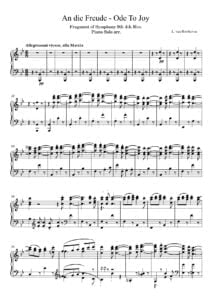 |
|
| Beethoven – Piano concerto 4 (Theme Easy piano solo) |
 |
|
| Beethoven – Piano Concerto 4 (Theme Easy Piano Solo) (Musescore File).mscz | ||
| Beethoven – Piano Concerto No 4 in G Op 58 (arr. for 2 pianos) | Beethoven – Piano Concerto No 4 | |
| Beethoven – Sonata No 23 Op 57 (Appassionata) Piano Solo (Musescore File).mscz | ||
| Beethoven – Sonata No. 8 Op. 13 Pathétique (Musescore File).mscz | ||
| Beethoven – Sonata Pathétique arr. for Guitar (Piano Sonata no. 8 in C minor op. 13 ) | Beethoven – Sonata Pathétique arr. for Guitar (Piano Sonata no. 8 in C minor op. 13 ) | |
| Beethoven – Sonata Pathétique arr. for Guitar (Piano Sonata no. 8 in C minor op. 13 ).mscz | ||
| Beethoven – Sonate Op 111 – Arietta (Liszt) |
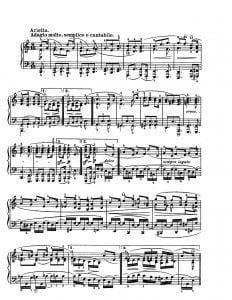 |
|
| Beethoven – Symphony n. 9 D 2H Pauer |
 |
|
| Beethoven – Symphony No. 5 (1st movement) Piano solo arr. |
 |
|
| Beethoven – Symphony No. 7 2nd Movement Piano Solo Arr. | Beethoven – Symphony No. 7 2nd Movement Piano Solo Arr. | |
| Beethoven – Symphony No. 9 3rd movement arr. for piano solo by Ernst Pauer | Beethoven – Symphony No. 9 3rd movement arr. for piano solo by Ernst Pauer | |
| Beethoven 2 cadenzas from Piano Concerto n 4 op 58 (arr. piano solo by Beethoven) | Beethoven 2 cadenzas from Piano Concerto n 4 | |
| BEETHOVEN ADAGIO from Piano Concerto Eb arr. piano solo |
 |
|
| Beethoven Analyse Pathetique | Beethoven Analyse Pathetique | |
| Beethoven by George Alexander Fischer (1905) Book |
 |
|
| Beethoven Duo For 2 Flutes Woo 26 (Musescore File).mscz | ||
| Beethoven Egmont Ouverture Piano solo Arr. Henselt |
 |
|
| Beethoven Egmont Overture Opus 84 Piano Solo arr. sheet music | Egmont Overture Opus 84 Beethoven 1st page | |
| Beethoven Fantasia G Minor Op.77 |
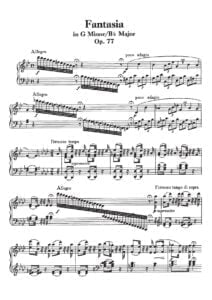 |
|
| Beethoven Fingerpicking For Guitar Solo with TABs |
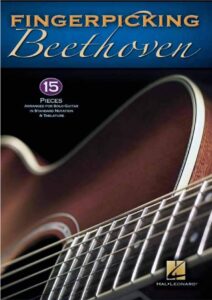 |
Beethoven Fingerpicking For Guitar Solo with TABs |
| Beethoven His Spiritual Development by J.W.N. Sullivan (Book) 1936 |
 |
|
| Beethoven L.V. Op 68 SYMPHONY VI arr. for 2 pianos |
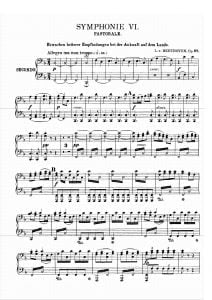 |
|
| Beethoven Leonore Overture No. 3 Piano Solo |
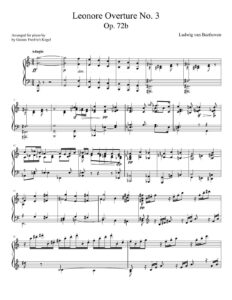 |
|
| Beethoven Leonore Overture No. 3 Piano Solo Musescore File.mscz | ||
| Beethoven Liszt 5th Symphony Piano Solo arr (Complete) |
 |
|
| Beethoven Liszt 5th Symphony Piano Solo arr.mscz | ||
| Beethoven Liszt – Symphony no. 9, 4th Movement Piano Solo arr. |
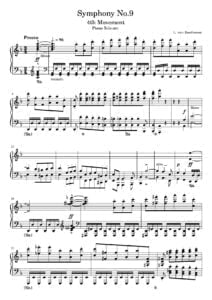 |
|
| Beethoven Liszt – Symphony No.9 4th Movement (Musescore File).mscz | ||
| Beethoven Liszt Marche Funebre |
 |
|
| Beethoven Liszt Symphony No. 9 – 1st Movement (S. 464) Piano Solo arr. | Beethoven_Liszt Symphony No. 9 – 1st Movement (S. 464) – Franz Liszt | |
| Beethoven Liszt Symphony No. 9 – 2nd Movement (S. 464) Piano Solo arr. | Beethoven_Liszt Symphony No. 9 – 2nd Movement (S. 464) – Franz Liszt | |
| Beethoven Moonlight Sonata 3rd Movement Guitar Tabs arr. | Beethoven Moonlight Sonata 3rd Movement Guitar Tabs arr. cover | |
| Beethoven Pastoral Symphony (piano reduction) | Beethoven Pastoral Symphony (piano reduction) | |
| Beethoven Piano Book 10 Musical selections (easy piano) |
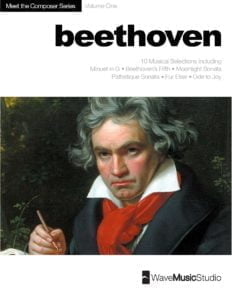 |
Beethoven Piano Book 10 Musical selections |
| Beethoven Piano Concerto 5 Piano Solo Reduction |
 |
|
| Beethoven Piano Concerto No 4 1st Movement (Arr For 2 Pianos) (Musescore File).mscz | ||
| Beethoven Piano Concerto No 4 3rd Mvmt (Arr For 2 Pianos) (Musescore File).mscz | ||
| Beethoven Piano Concerto No 4 Op 58 Piano Solo Reduction |
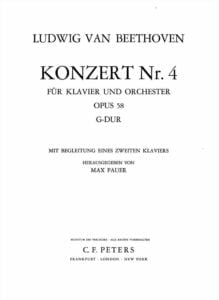 |
|
| Beethoven Piano Concerto No 5 (1st Movement) Arr For 2 Pianos (Musescore File).mscz | ||
| Beethoven Piano Concerto No 5 2nd Movement Fragment (Piano Solo) (Musescore File).mscz | ||
| Beethoven Piano Concerto No. 4 1st Movement Arr. For 2 Pianos.mscz | ||
| Beethoven Piano Concerto No. 4 3rd Movement Arr. For 2 Pianos.mscz | ||
| Beethoven Piano Sonata No.17 “tempest” 1st Movt. (Musescore File).mscz | ||
| Beethoven Sonata Op 49 No 2 (Musescore File).mscz | ||
| Beethoven Sonate No 8 “pathétique” Op. 13 1st Movement (Musescore File).mscz | ||
| Beethoven Symphony n.6 F 2H Pauer | ||
| Beethoven Symphony No 5 (1st Movement) Piano Solo (Musescore File).mscz | ||
| Beethoven Symphony No 6 Pastoral (1st Movement) Piano Solo (Musescore File).mscz | ||
| Beethoven Symphony No 6 Pastoral (3rd Movement) Piano Solo (Musescore File).mscz | ||
| Beethoven Symphony No 6 Pastoral (4th Movement) Piano Solo (Musescore File).mscz | ||
| Beethoven Symphony No 6 Pastoral (5th Movement) Piano Solo(1) (Musescore File).mscz | ||
| Beethoven Symphony No 7 (2nd Movement) Piano Solo (Musescore File).mscz | ||
| Beethoven Symphony No 9 (1st Movement) Piano Solo (Musescore File).mscz | ||
| Beethoven Symphony No 9 (2nd Movement-Scherzo) Piano Solo (Musescore File).mscz | ||
| Beethoven Symphony No. 5 (1st Movement) Piano Solo (Musescore File).mscz | ||
| Beethoven Symphony No. 6 Pastoral (2nd Movement) Piano Solo (Musescore File).mscz | ||
| Beethoven Symphony No. 6 Pastoral 2nd Movement (Musescore File).mscz | ||
| Beethoven Symphony No. 7 2nd Movement Piano Solo Arr. (Musescore File).mscz | ||
| Beethoven Symphony No.6 Op.68 piano solo arr. by Liszt |
 |
|
| BEETHOVEN The Complete Variations For Piano Solo |
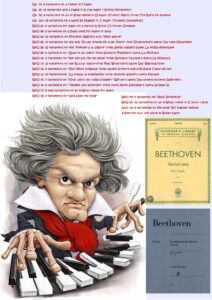 |
BEETHOVEN The Complete Variations For Piano Solo_compressed |
| Beethoven Variations and Fugue in E-flat major (Eroica Variations) Op. 35.mscz | ||
| Beethoven Virus Jazz |
 |
|
| Beethoven_Liszt Symphony No. 9 – 1st Movement (S. 464) – Franz Liszt Piano Solo arr.mscz | ||
| Beethoven_Liszt Symphony No. 9 – 2nd Movement (S. 464) – Franz Liszt Piano Solo arr.mscz | ||
| Beethoven_Symphony_No._9_3rd_movement_for_piano_solo.mscz | ||
| Beethoven- Liszt Symphony no. 6 Pastorale piano solo arr. |
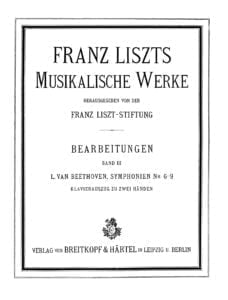 |
|
| Beethoven-Liszt Symphony 9 Choral (arr. for piano) |
 |
|
| Beethoven-Ludwig-van – Sonaten alle complete Band 1 (1-15) |
 |
|
| Beethoven-Ludwig-Van – Sonaten Alle Complete Band 2 (16-32) |
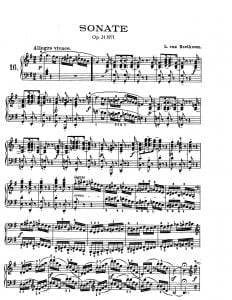 |
|
| Beethoven-Moszkowski – Emperor piano solo Transcription |
 |
|
| Beethoven’s 32 Piano Sonatas A Handbook For Performers (BOOK) |
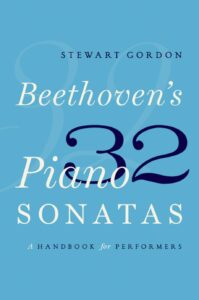 |
|
| Beethoven’s Arrangements For Solo Piano Of The 9 Symphonies By E. Pauer |
 |
|
| Beethoven’s Last Piano Sonatas, Piano Sonata In A Major, Op. 101 An Edition With Elucidation, Volume 4 |
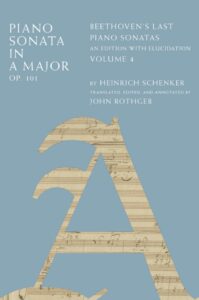 |
|
| Beethoven’s Last Piano Sonatas, Piano Sonata In E Major, Op. 109 An Edition With Elucidation, Volume 1 |
 |
|
| Beetlejuice – Obituaries – Danny Elfman | Beetlejuice – Obituaries – Danny Elfman | |
| Beetlejuice Theme – Danny Elfman |
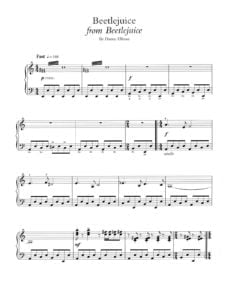 |
|
| Beetoven – Klaviersonate Nr. 14 Mondscheinsonate (Piano Sonata No. 14 Moonlight) 3rd Mov. (Musescore File).mscz | ||
| Beginning Gospel For Piano Easy Piano |
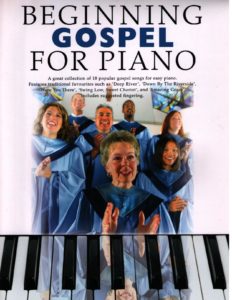 |
Beginning Gospel For Piano Easy Piano |
| Beginning Jazz Guitar The Complete Jazz Guitar Method by Jody Fisher (with audio MP3 audio tracks and Tablature) |
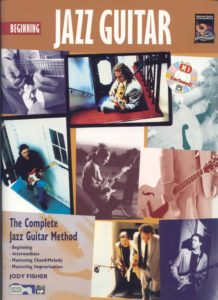 |
Beginning Jazz Guitar |
| Beginning Solo Guitar Merry Christmas with Tablature |
 |
Beginning Solo Guitar Merry Christmas |
| Béla Bartók Romanian Folk Dances Sz. 56 Piano Solo Sheet Music |
 |
|
| Bela Bartok – Music For Strings, Percussion And Celesta Sz. 106 (Piano Transcription) | Bela Bartok – Music For Strings, Percussion And Celesta Sz. 106 (Piano Transcription) | |
| Béla Bartók An Analysis Of His Music (Book) By Ernö Lendvai |
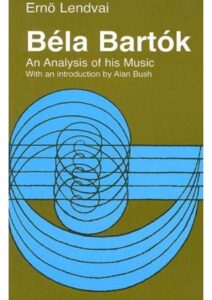 |
|
| Bella Ciao – As Performed In La Casa De Papel (Traditional Italian Anti-Fascist Song) (Musescore File).mscz | ||
| Bella Ciao (As performed in La Casa de Papel – Money Heist) Traditional Italian song (Anti-fascist) | Bella Ciao | |
| Bella Ciao Ukulele with Tablature TABs | Bella Ciao Ukulele with Tablature TABs | |
| Bella gioventù (Renato Zero) | ||
| Bella’s Lullaby (Carter Burwell) | ||
| Belle OST – A Million Miles Away by Rachel Portman |
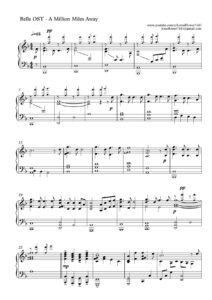 |
|
| Bellini Casta Diva (piano) | Bellini-CastaDiva | |
| Bellini – Casta diva (Norma) Easy Piano Solo arr. |
 |
|
| Bellini – Casta Diva (Norma) Easy Piano Solo Arr. (Musescore File).mscz | ||
| Bellini – Norma Casta Diva arr. piano solo |
 |
|
| Beltrami, Marco – The Giver – Rosemary’s Piano |
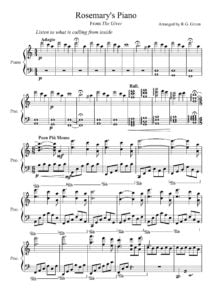 |
|
| Ben (Michael Jackson) | ||
| Ben E King – Stand By Me | ||
| Ben Folds – Annie Waits | ||
| Ben Folds – Brick | ||
| Ben Folds – Carrying Cathy | ||
| Ben Folds – Effington (Solo) |
 |
|
| Ben Folds – Fired | ||
| Ben Folds – Gone | ||
| Ben Folds – Losing Lisa | ||
| Ben Folds – Not The Same | ||
| Ben Folds – Rockin The Suburbs | ||
| Ben Folds – Still Fighting It | ||
| Ben Folds – The Luckiest | ||
| Ben Folds – Zak And Sara | ||
| Ben Harper – Fight For Your Mind (Songbook) (Ben Harper) Guitar TABs |
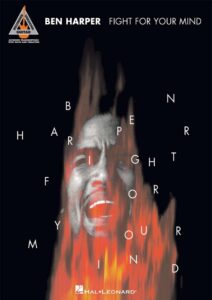 |
Ben Harper – Fight For Your Mind (Songbook) (Ben Harper) Guitar TABs |
| Ben Webster – Better Go The Quintet Studio Sessions |
 |
|
| Ben Webster – Solo on Solitude By Duke Ellington | Ben Webster – Solitude By Duke Ellington | |
| Ben Webster – Someone to Watch Over Me The Life and Music of Ben Webster (Jazz Perspectives) (Frank Buchmann-Moller) Book |
 |
|
| Ben Webster Stormy Weather – (solo Tenor Sax)I Cant Get Started | Ben Webster Stormy Weather – (solo Tenor Sax)I Cant Get Started | |
| Benjamin Waldmann Circles |
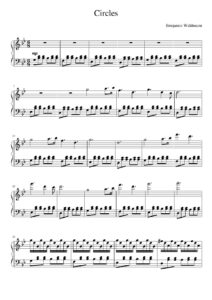 |
